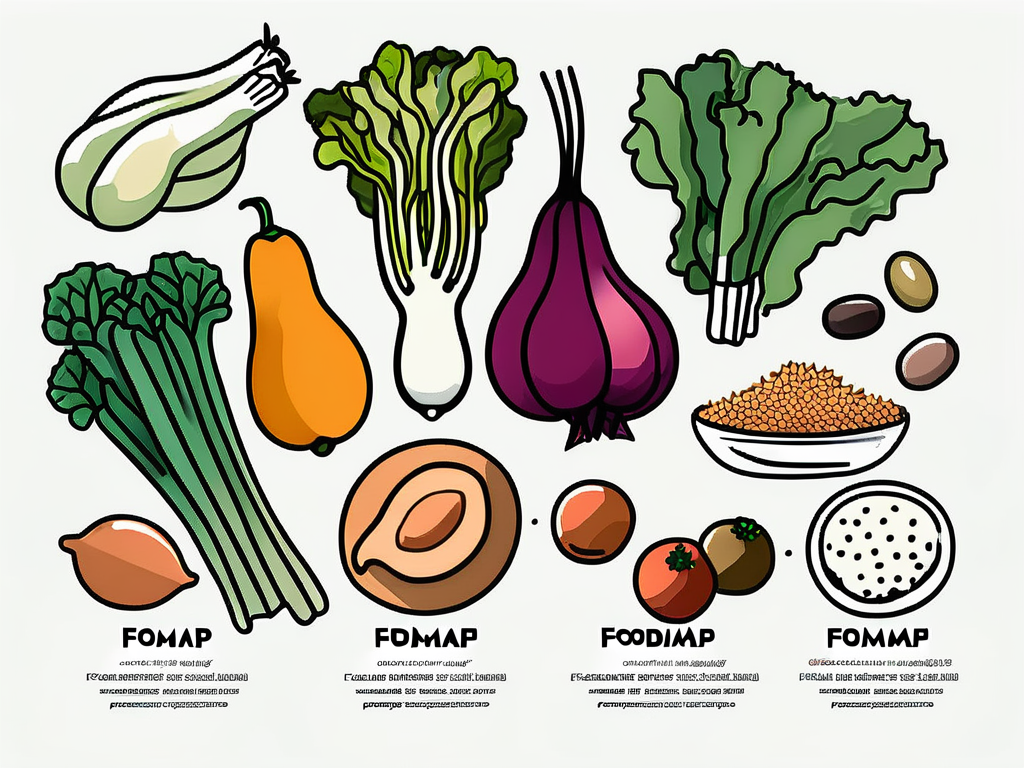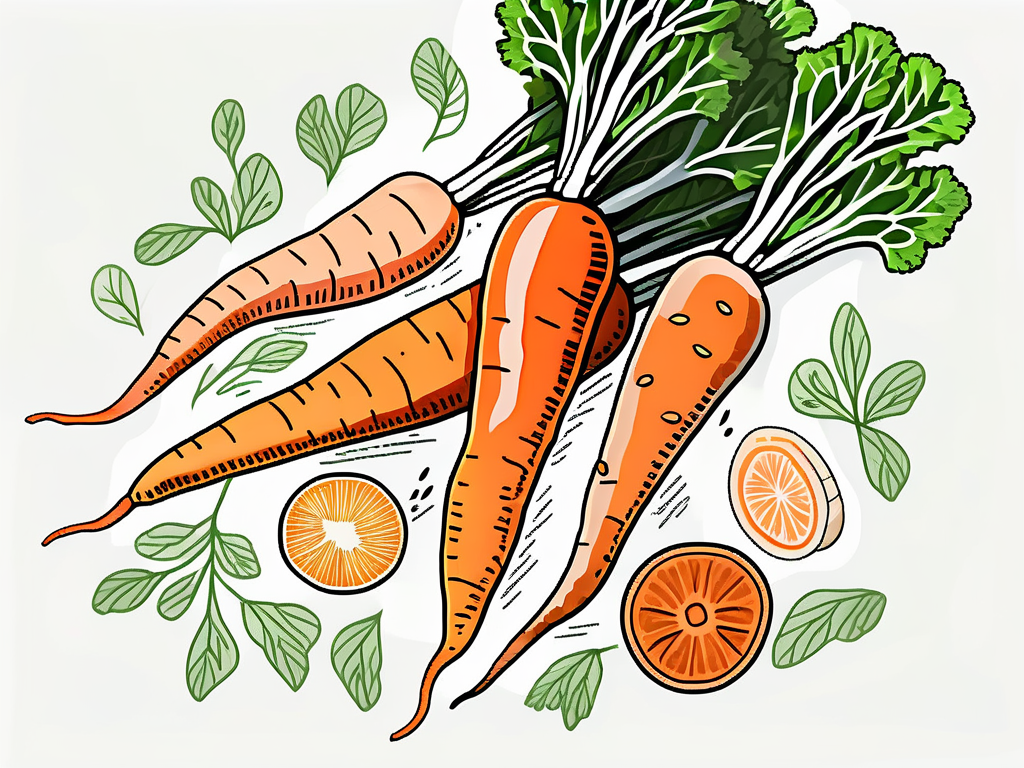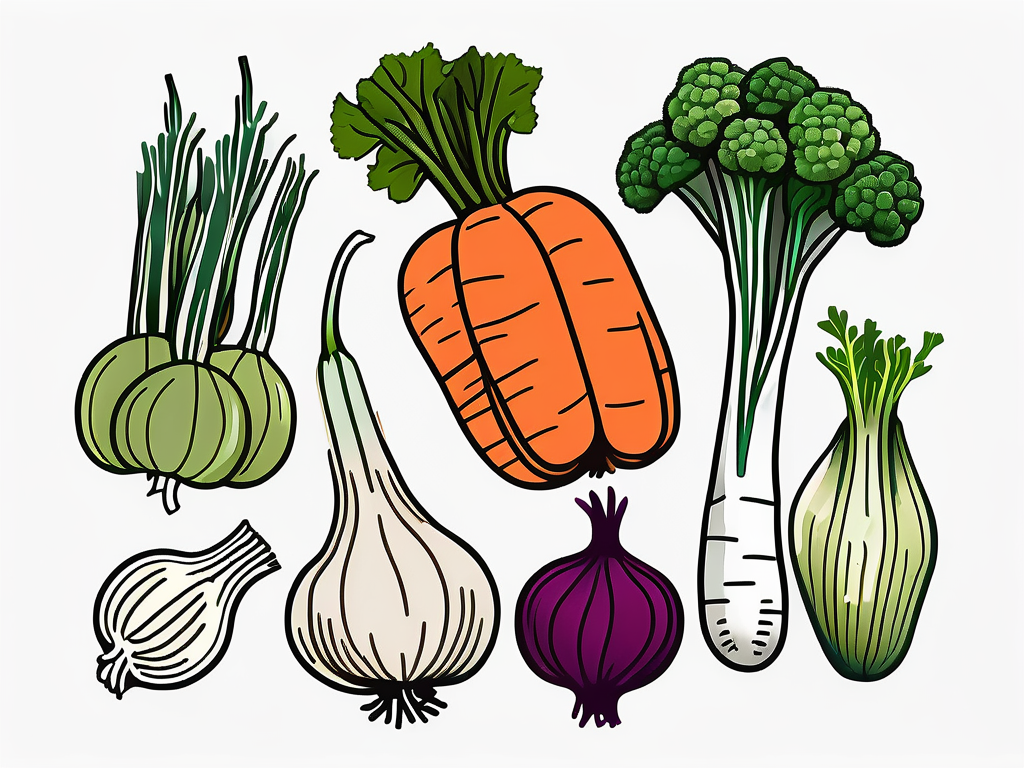In recent years, the FODMAP diet has gained popularity for its potential to alleviate symptoms in individuals with irritable bowel syndrome (IBS) and other digestive disorders. If you're considering adopting a low FODMAP diet, you may be wondering if carrots are safe to include. In this article, we will explore the relationship between carrots and FODMAPs, as well as their nutritional profile and health benefits.
Understanding FODMAP
FODMAP is an acronym that stands for Fermentable Oligosaccharides, Disaccharides, Monosaccharides, and Polyols. These are a group of carbohydrates and sugar alcohols that can be poorly absorbed by the small intestine, resulting in digestive symptoms such as bloating, gas, and abdominal pain in susceptible individuals.

What is FODMAP?
FODMAPs are naturally present in a wide variety of foods, including fruits, vegetables, grains, dairy products, and legumes. The main types of FODMAPs include fructose, lactose, fructans, galactans, and polyols.
Fructose, a type of sugar found in fruits, honey, and some vegetables, can be difficult for some individuals to digest. Lactose, the sugar present in dairy products, may cause digestive issues for those with lactose intolerance. Fructans, which are found in foods like wheat, onions, and garlic, can trigger symptoms in sensitive individuals. Galactans, present in legumes such as beans and lentils, can also contribute to digestive discomfort. Polyols, sugar alcohols like sorbitol and mannitol found in certain fruits and artificial sweeteners, are known to cause digestive issues in some people.
Why is FODMAP Important?
For individuals with IBS or other digestive disorders, following a low FODMAP diet can help reduce symptoms and improve overall quality of life. By eliminating or limiting high FODMAP foods, digestive distress can be minimized, allowing for better gastrointestinal health.
It is essential for individuals considering a low FODMAP diet to work with a healthcare professional or a registered dietitian to ensure nutritional adequacy while avoiding symptom-triggering foods. The FODMAP diet is not meant to be followed long-term, as it restricts certain food groups that are important for overall health. With proper guidance, individuals can identify their trigger foods and learn to manage their symptoms effectively without compromising their nutritional needs.
The Nutritional Profile of Carrots
Carrots, known for their vibrant orange color, are not only visually appealing but also pack a nutritional punch. They are low in calories and fat while being rich in vitamins, minerals, and antioxidants.

Carrots are a versatile vegetable that can be enjoyed in various ways, whether raw, cooked, or juiced. Their sweet and earthy flavor makes them a popular choice for salads, soups, stews, and even desserts. In addition to their culinary uses, carrots have been used for centuries in traditional medicine for their health benefits.
Carrot's Nutrient Content
Carrots are an excellent source of vitamin A, providing over 100% of the daily recommended intake in just one serving. Additionally, they contain vitamin C, vitamin K, potassium, and fiber, making them a nutritious choice for your overall health.
One interesting fact about carrots is that they also contain small amounts of biotin, which is a B vitamin that plays a key role in metabolism. Biotin is essential for converting food into energy and maintaining healthy skin, hair, and nails. Including carrots in your diet can help ensure you're getting a good dose of this important nutrient.
Health Benefits of Carrots
Carrots are known for their role in promoting good eye health due to their high beta-carotene content. Beta-carotene is converted to vitamin A in the body, which is essential for maintaining normal vision. Carrots also contain antioxidants that help protect against cell damage and reduce the risk of chronic diseases.
Aside from eye health, the fiber in carrots can aid in digestion and promote a healthy gut. The soluble fiber in carrots can help regulate blood sugar levels and cholesterol, while the insoluble fiber supports regular bowel movements and overall gut health. Including carrots in your daily diet can contribute to your overall well-being and support a healthy digestive system.
Carrots and FODMAPs
Now, let's address the burning question: Are carrots low FODMAP or high FODMAP?
FODMAP Content in Carrots
According to Monash University, a prominent authority on the FODMAP diet, carrots are considered low FODMAP. This means that they contain minimal amounts of FODMAPs and are generally well-tolerated by most individuals, even those following a strict low FODMAP diet.
How Carrots Impact Digestion
Carrots are rich in fiber, which plays a crucial role in maintaining a healthy digestive system. The fiber in carrots can help regulate bowel movements and promote regularity, which is particularly beneficial for individuals with constipation-predominant IBS.
Moreover, carrots are a great source of beta-carotene, a precursor to vitamin A, which is essential for maintaining healthy vision, skin, and immune function. In fact, just one medium-sized carrot can provide over 100% of the recommended daily intake of vitamin A. This nutrient not only supports overall health but also acts as a powerful antioxidant, helping to protect cells from damage caused by free radicals.
Additionally, carrots contain various phytonutrients such as lutein and zeaxanthin, which are known for their role in promoting eye health and reducing the risk of age-related macular degeneration. These compounds help filter harmful high-energy blue light and protect the eyes from oxidative stress, ultimately supporting optimal vision and eye function.
Incorporating Carrots into a Low FODMAP Diet
If you're following a low FODMAP diet, incorporating carrots into your meals can be a nutritious and delicious option. Carrots are not only rich in beta-carotene, which is beneficial for eye health, but they also provide a good source of fiber and essential vitamins like K1 and potassium.
When selecting carrots for your low FODMAP diet, opt for fresh carrots rather than pre-cut or baby carrots, as they may have added high FODMAP ingredients for preservation. Look for firm, smooth carrots without any signs of mold or soft spots.
Preparing Carrots for a Low FODMAP Diet
When preparing carrots, it's essential to peel them and remove any tough outer skin to minimize the fiber content. You can also cook carrots to make them softer and easier to digest. Steaming or roasting carrots can help break down the fibers, making them gentler on the digestive system.
For added flavor, consider seasoning your cooked carrots with herbs like dill, parsley, or chives, which are low FODMAP and can enhance the taste without causing digestive discomfort.
Serving Sizes and FODMAP Levels
It's important to note that while carrots are low FODMAP, consuming large amounts may still contribute to bloating and gas in some individuals. It's best to stick to the recommended serving size, which is typically around half a cup or 75 grams. Pairing carrots with other low FODMAP foods like rice, chicken, or spinach can help create a balanced and satisfying meal without triggering digestive issues.
Other Low FODMAP Vegetables to Consider
While carrots are a safe bet for a low FODMAP diet, there are plenty of other vegetables to explore.

When it comes to following a low FODMAP diet, variety is key. Incorporating a diverse range of low FODMAP vegetables can not only help prevent food boredom but also ensure you are getting a wide array of essential nutrients to support your overall health.
List of Low FODMAP Vegetables
Some other low FODMAP vegetables to consider adding to your meals include nutrient-packed options like spinach, rich in iron and vitamins A and C; colorful bell peppers, which are high in antioxidants like vitamin C; zucchini, a versatile vegetable that can be spiralized into noodles or grilled for a tasty side dish; hydrating cucumber, a refreshing addition to salads and sandwiches; crunchy bok choy, a great source of vitamin K and calcium; and fiber-rich green beans, perfect for stir-fries and casseroles.
Experimenting with these low FODMAP vegetables can open up a world of culinary possibilities, allowing you to create flavorful and satisfying dishes while keeping your digestive system happy and healthy.
Balancing Your Diet with Low FODMAP Foods
Remember, the low FODMAP diet is not meant to be followed long-term. It is essential to work with a registered dietitian who specializes in digestive health to ensure adequate nutrient intake and a balanced diet while managing your symptoms.
In conclusion, carrots are considered low FODMAP, making them a safe and nutritious choice for individuals following a low FODMAP diet. With their rich nutrient profile and health benefits, carrots can be enjoyed as part of a well-rounded and digestive-friendly meal plan. Remember to listen to your body and work closely with a healthcare professional to tailor your diet to your individual needs. Here's to happy and healthy eating!